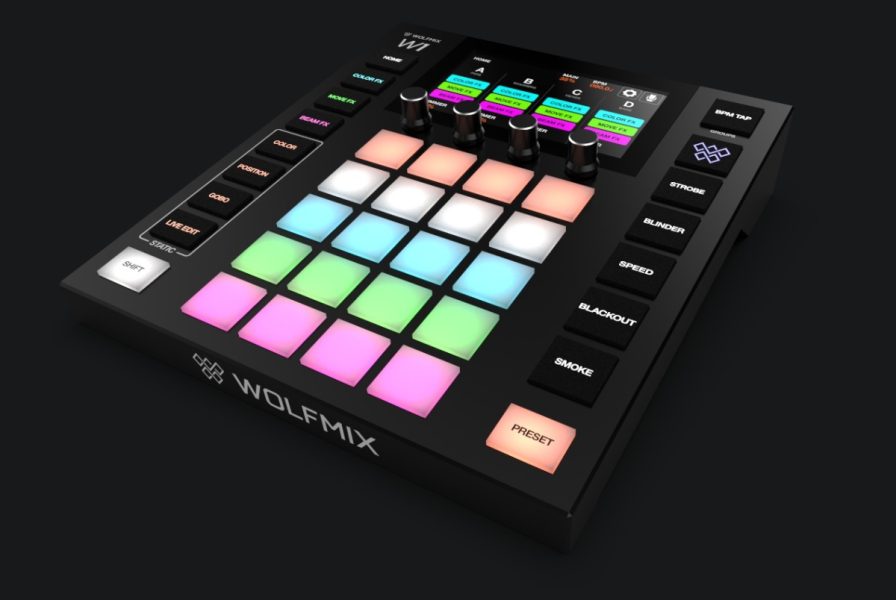What was the inspiration for the Wolfmix W1?
“We wanted to take the idea of DJ controllers and samplers, and combine these concepts with a DMX lighting controller. By this I mean a friendly, familiar and approachable piece of hardware built with metal and ABS plastic, compact and not too heavy, with backlit silicone buttons and encoders. At the same time, we wanted to do away with the limitations of typical hardware controllers of a similar form factor. The key to making the controller powerful and easy to use was to utilise a fixture library and create a system able to understand the capabilities of a particular lighting fixture, generate effects and functions, and then lay these out over an intuitive UI which was instantly familiar to a DJ, engineer or musician, rather than just a lighting programmer.
Where does the Wolfmix W1 sit in the market?
“There are thousands of DJs, musicians and engineers working with DMX lights who want to make great looking light shows quickly and have them operate reliably. If you go for a larger console, it takes time to learn. If you like a computer, it must be set up and learnt. If you have a tablet, you are often restricted to the reliability of the Wi-Fi. If you have a smaller piece of hardware, its capabilities are generally limited and not always intuitive. We felt there was a gap in the market for a compact, powerful and easy to use controller.”
What was behind the DJ-friendly design?
“Although we didn’t speak directly with any manufacturers, we love all kinds of DJ and electronic music equipment. We took a screwdriver and started taking apart anything we could get our hands on. Most of the inspiration came from the surface of these controllers – the materials they are constructed from and the way they combine hardware and software functions. A couple of specific examples being that all major functions must be accessible with one or two button pushes, and to avoid having ‘touch and hold’, or pressing two buttons simultaneously with the SHIFT button being the only exception.”
How has the response been from end users?
“We knew we were on to something, but since we launched within the past year, it’s gone way beyond what we expected – both in terms of sales quantities, feedback, and the types of users. Although primarily designed for DJs and clubs, we’ve found event companies have been sending out a Wolfmix for their parties and corporate events. The response we have had from them is that they can set up their light show in an hour without the need to hire an experienced lighting programmer. Wolfmix W1 can be left with the production manager or sound engineer. This is also important in the current climate as budgets become tighter, setup time is at a premium and logistics are more challenging than ever. We’re currently scrambling to learn how to efficiently manufacture Wolfmix W1s in quantities of 10,000 units at a time while keeping the high level of quality our customers expect.”
How would end users prepare for a show with Wolfmix W1?
“To prepare a lighting performance with the Wolfmix, you start by choosing a lighting fixture from our library of over 20,000 fixtures. We have a built-in fixture builder and also offer a free service if the fixture is not already in our library. Once the fixture has been added and DMX address set, it will immediately spring to life. We have a Move FX module which works like an effects unit, plug-in, or guitar fix pedal. You just need to turn it on and begin playing with the available patterns, speed, size, fading, phasing and other parameters as you would with say a Reverb FX unit. Favourite looks and effects can then be stored in presets in the same way as you would with traditional car stereo, for quick recall.”
How large a lighting rig would the W1 be able to control?
“Well, you could in theory control Wembley stadium if you address all your lights to 001! Realistically, the controller should suit your typical club or medium-sized event rig, with up to four universes. Wolfmix ships with a demo project containing 16 moving heads, eight RGBW pars and a seven by seven matrix of colour panels, and there’s enough power to triple the size of this project.”


